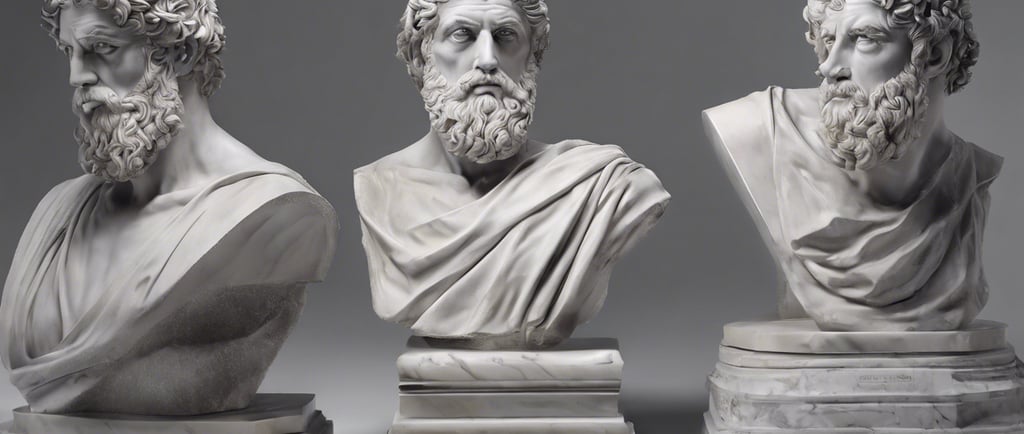From Slave to Sage: 3 Life-Changing Teachings from Epictetus for Beginners
What if one of history's most powerful thinkers on freedom was once a slave? Meet Epictetus, a man born into slavery around 50 AD who, despite having no control over his own body or circumstances, achieved a level of inner freedom that kings and emperors could only envy. He couldn't choose his master, but he could choose his response. He couldn't control his fate, but he could control his mind. His philosophy wasn't born in a comfortable lecture hall; it was forged in the fires of real hardship. That’s why his teachings are not just profound—they are intensely practical. Here is a beginner's guide to three of his most life-changing ideas that you can start using today.
STOICISM
9/26/20253 min read


Who Was Epictetus? The Slave Who Mastered His Mind
Born in what is now Turkey, Epictetus spent his youth as a slave in Rome. His leg was crippled—some say his cruel master broke it—but his mind remained unbreakable. After gaining his freedom, he became one of the most revered Stoic philosophers of his time, teaching that the goal of life is eudaimonia: a state of lasting tranquility and human flourishing.
His wisdom was written down by his student Arrian in two famous works, the Discourses and the Enchiridion (or "The Handbook"), a short guide to the art of living that has influenced everyone from Roman emperors to modern-day entrepreneurs.
Teaching 1: Master the Dichotomy of Control
This is the absolute cornerstone of Epictetus's philosophy and the ultimate tool for reducing anxiety. He taught that everything in life falls into two simple categories:
Things up to us (within our control): Our judgments, our intentions, our choices, our attitude, and our actions.
Things not up to us (outside our control): Everything else. This includes our health, our reputation, what others think, the weather, and the outcome of our efforts.
The source of most of our stress, frustration, and sadness comes from trying to control things in the second category. Epictetus argued that true peace is found by focusing 100% of your energy on what is yours to command: your own mind.
How to apply it: The next time you feel stressed, pause and ask yourself, "Is the thing I'm worried about in my circle of control?" If the answer is no, your job is to accept it calmly and focus on what you can do: choose a virtuous and rational response.
Teaching 2: It's Your Judgment That Hurts You, Not the Event
"Men are disturbed not by things, but by the views which they take of them." - Epictetus
This is one of the most powerful psychological insights ever discovered and is the foundation of modern Cognitive Behavioral Therapy (CBT). Epictetus taught that events themselves are neutral. They are neither "good" nor "bad." It is the story we tell ourselves—the judgment we attach to the event—that causes our suffering.
Getting stuck in traffic is not inherently bad. It's just traffic. It's your judgment, "This is a nightmare! My day is ruined!" that creates the anger. Someone's rude comment is just a vibration in the air. It is your judgment, "How dare they disrespect me!" that creates the hurt.
How to apply it: When something "bad" happens, create a small mental gap. Recognize the event for what it is—a neutral fact—and then consciously examine the story you're telling yourself about it. You have the power to choose a different, more rational, and less painful judgment. This is the definition of emotional freedom.
Teaching 3: Play the Role You've Been Given, and Play It Well
Epictetus used a powerful metaphor for life: we are all actors in a grand play written by a divine playwright (or fate, or the universe). We don't get to choose our role. You might be cast as a parent, a student, a wealthy person, or someone facing illness.
Your job is not to complain about the part you've been assigned. Your job is to play it with excellence, virtue, and dignity.
This teaching encourages radical acceptance of your circumstances. It doesn't matter where you start; what matters is how you act. A slave can be more honorable than a king if he plays his role virtuously. This mindset replaces feelings of "why me?" with a sense of purpose and duty.
How to apply it: Whatever your circumstances are today, ask yourself, "Given my role, what is the most virtuous and excellent way I can act right now?" This focuses you on character and right action, the only things that truly matter.
Why Epictetus Is the Perfect Guide for Modern Life
In a world that constantly pulls for our attention and provokes our outrage, the teachings of Epictetus are a radical call for inner peace. By focusing on what you control, choosing your judgments wisely, and playing your part well, you can build an unshakeable inner fortress. You can be free, no matter what life throws at you.
Waste no more time arguing about what a good man should be. Be one - Marcus Aurelius
We suffer more often in imagination than in reality - Seneca
Wealth consists not in having great possessions, but in having few wants - Epictetus
